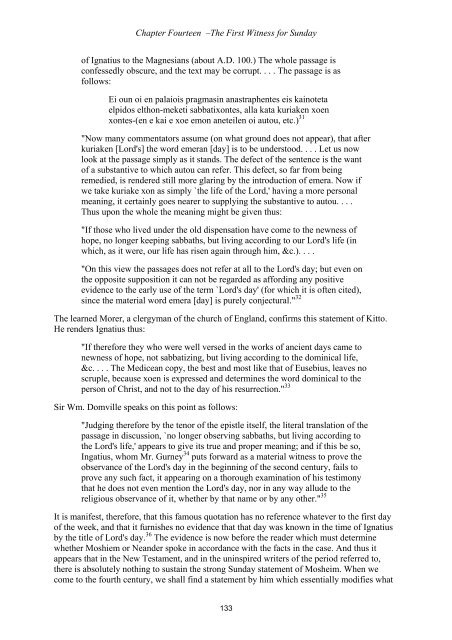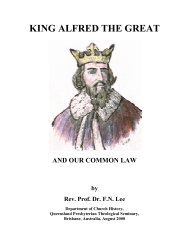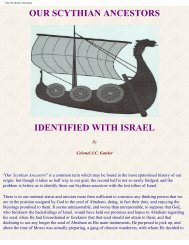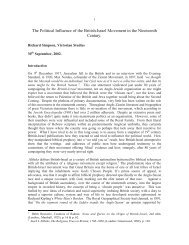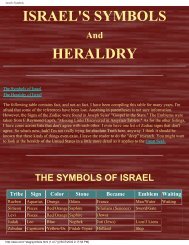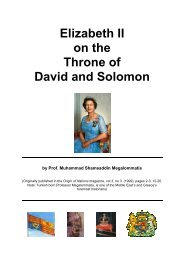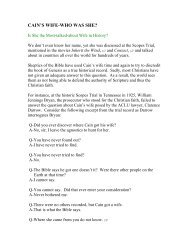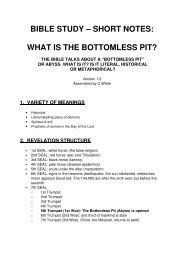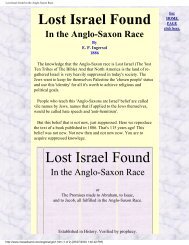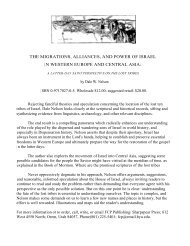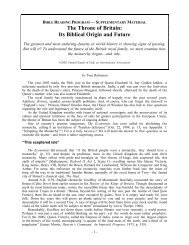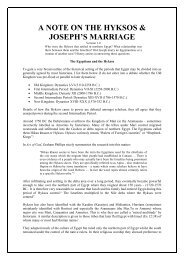HISTORY OF THE SABBATH - Friends of the Sabbath Australia
HISTORY OF THE SABBATH - Friends of the Sabbath Australia
HISTORY OF THE SABBATH - Friends of the Sabbath Australia
Create successful ePaper yourself
Turn your PDF publications into a flip-book with our unique Google optimized e-Paper software.
Chapter Fourteen –The First Witness for Sunday<strong>of</strong> Ignatius to <strong>the</strong> Magnesians (about A.D. 100.) The whole passage isconfessedly obscure, and <strong>the</strong> text may be corrupt. . . . The passage is asfollows:Ei oun oi en palaiois pragmasin anastraphentes eis kainotetaelpidos elthon-meketi sabbatixontes, alla kata kuriaken xoenxontes-(en e kai e xoe emon aneteilen oi autou, etc.) 31"Now many commentators assume (on what ground does not appear), that afterkuriaken [Lord's] <strong>the</strong> word emeran [day] is to be understood. . . . Let us nowlook at <strong>the</strong> passage simply as it stands. The defect <strong>of</strong> <strong>the</strong> sentence is <strong>the</strong> want<strong>of</strong> a substantive to which autou can refer. This defect, so far from beingremedied, is rendered still more glaring by <strong>the</strong> introduction <strong>of</strong> emera. Now ifwe take kuriake xon as simply `<strong>the</strong> life <strong>of</strong> <strong>the</strong> Lord,' having a more personalmeaning, it certainly goes nearer to supplying <strong>the</strong> substantive to autou. . . .Thus upon <strong>the</strong> whole <strong>the</strong> meaning might be given thus:"If those who lived under <strong>the</strong> old dispensation have come to <strong>the</strong> newness <strong>of</strong>hope, no longer keeping sabbaths, but living according to our Lord's life (inwhich, as it were, our life has risen again through him, &c.). . . ."On this view <strong>the</strong> passages does not refer at all to <strong>the</strong> Lord's day; but even on<strong>the</strong> opposite supposition it can not be regarded as affording any positiveevidence to <strong>the</strong> early use <strong>of</strong> <strong>the</strong> term `Lord's day' (for which it is <strong>of</strong>ten cited),since <strong>the</strong> material word emera [day] is purely conjectural." 32The learned Morer, a clergyman <strong>of</strong> <strong>the</strong> church <strong>of</strong> England, confirms this statement <strong>of</strong> Kitto.He renders Ignatius thus:"If <strong>the</strong>refore <strong>the</strong>y who were well versed in <strong>the</strong> works <strong>of</strong> ancient days came tonewness <strong>of</strong> hope, not sabbatizing, but living according to <strong>the</strong> dominical life,&c. . . . The Medicean copy, <strong>the</strong> best and most like that <strong>of</strong> Eusebius, leaves noscruple, because xoen is expressed and determines <strong>the</strong> word dominical to <strong>the</strong>person <strong>of</strong> Christ, and not to <strong>the</strong> day <strong>of</strong> his resurrection." 33Sir Wm. Domville speaks on this point as follows:"Judging <strong>the</strong>refore by <strong>the</strong> tenor <strong>of</strong> <strong>the</strong> epistle itself, <strong>the</strong> literal translation <strong>of</strong> <strong>the</strong>passage in discussion, `no longer observing sabbaths, but living according to<strong>the</strong> Lord's life,' appears to give its true and proper meaning; and if this be so,Ingatius, whom Mr. Gurney 34 puts forward as a material witness to prove <strong>the</strong>observance <strong>of</strong> <strong>the</strong> Lord's day in <strong>the</strong> beginning <strong>of</strong> <strong>the</strong> second century, fails toprove any such fact, it appearing on a thorough examination <strong>of</strong> his testimonythat he does not even mention <strong>the</strong> Lord's day, nor in any way allude to <strong>the</strong>religious observance <strong>of</strong> it, whe<strong>the</strong>r by that name or by any o<strong>the</strong>r." 35It is manifest, <strong>the</strong>refore, that this famous quotation has no reference whatever to <strong>the</strong> first day<strong>of</strong> <strong>the</strong> week, and that it furnishes no evidence that that day was known in <strong>the</strong> time <strong>of</strong> Ignatiusby <strong>the</strong> title <strong>of</strong> Lord's day. 36 The evidence is now before <strong>the</strong> reader which must determinewhe<strong>the</strong>r Moshiem or Neander spoke in accordance with <strong>the</strong> facts in <strong>the</strong> case. And thus itappears that in <strong>the</strong> New Testament, and in <strong>the</strong> uninspired writers <strong>of</strong> <strong>the</strong> period referred to,<strong>the</strong>re is absolutely nothing to sustain <strong>the</strong> strong Sunday statement <strong>of</strong> Mosheim. When wecome to <strong>the</strong> fourth century, we shall find a statement by him which essentially modifies what133


